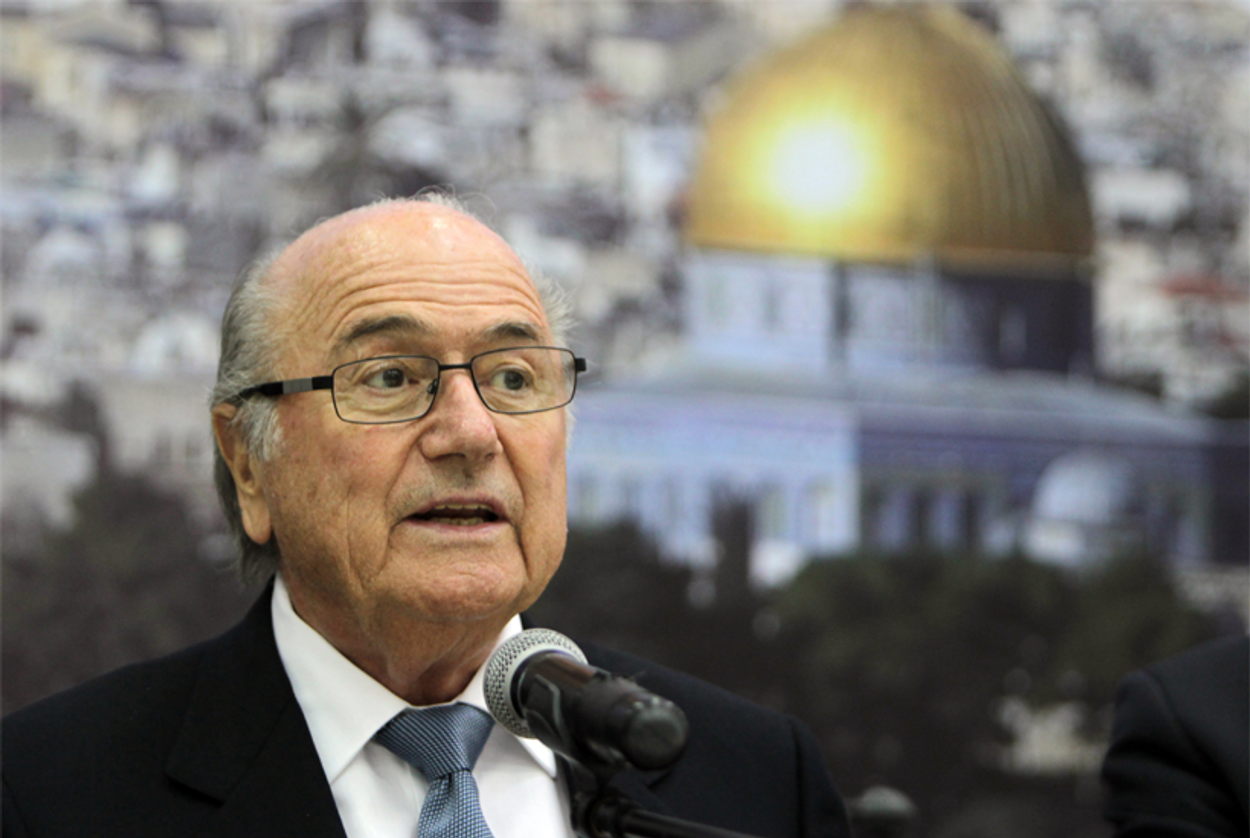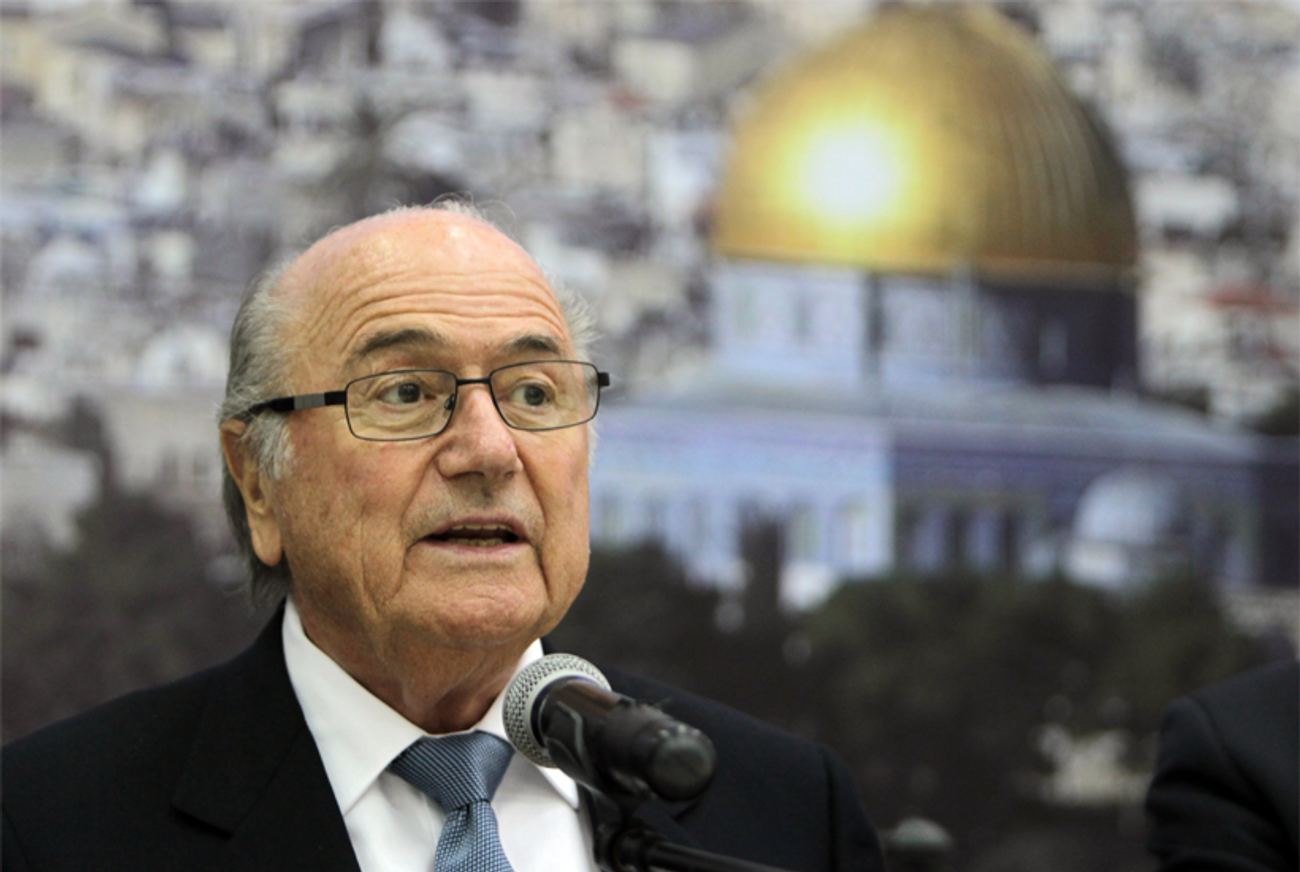Soccer, Like Politics, Is About Corruption, Incompetence, and Obsessing With the Jews
Ravaged by allegations of widespread corruption, FIFA—world soccer’s controlling body—focuses on Israel




There are very few things in this world I love more dearly than the World Cup. Every four years, like a crazed pilgrim to the pitch, I shun all other forms of human engagement, chant the names of Cameroon’s captain or Croatia’s midfielder as if they were life-giving mantras, and howl as the titans of soccer kick, block, and tackle their way into eternal glory.
But not this year.
I’ll still watch the games. I’ll still shout and cheer and curse. But every kick will remind me that what I’m really looking at is the spectacle put forth by a supremely corrupt authority, one that will earn $4 billion this year by sacrificing its own integrity, the principles of sportsmanship, and the sanctity of human life.
In case this sounds overly dramatic, a quick tour of soccer’s sickness is in order. This past weekend, the New York Times uncovered a match-rigging syndicate that fixed 15 games or more ahead of 2010’s tournament in South Africa. Unimprovably named Football 4 U Int’l, the cartel managed to bribe its way into some of soccer’s most sensitive nerve centers, appointing its own referees and then watching with delight as they called handballs that never were and performed other acts of perfidy to ensure the outcome desired by their paymasters.
The revelations struck a nerve with fans and officials alike, suggesting that the beautiful game may be anything but. Still, the corruption of 2012 pales in comparison with that of 2022, the year the cup will be held in Qatar.
To understand just how senseless the decision to give the Arab emirate the privilege of hosting soccer’s premier tournament truly is, all you have to do is set the temperature in your apartment to 122 degrees Fahrenheit and then run around nonstop for an hour and a half. If you’re still sentient, you can stop and reflect on the fact that Qatar has no soccer tradition to speak of and little by way of civil liberties—the sort that ought to be insisted upon as the minimal requirement for hosting an international sporting event—and that its climate and political conditions alike are killing the migrant workers charged with building its shiny new stadiums, with 184 Nepalis having perished last year alone and as many as 4,000 people slated to die by the time the whistle blows on the first match of the tournament, eight years from now.
How, then, did Qatar win the privilege of playing host? That’s easy: $5 million in bribes, according to a report this weekend in England’s The Sunday Times, including $1.6 million to Jack Warner, the former vice president of FIFA, world soccer’s controlling body, and sizable cash prizes paid to at least 25 other senior FIFA officials.
The organization’s president, Sepp Blatter, has largely kept silent on these and other accusations of systemic corruption. He has also had precious little to say about Russia, which will host the tournament in 2018 after Vladimir Putin himself hosted a handful of high-ranking soccer executives in his dacha and pressed his country’s case. That racism—including Nazi slogans—is rampant in Russia’s football stadiums; that Russia—unlike most other European nations—has done little or nothing to combat this revolting and dangerous phenomenon; that the invasion of Crimea, condemned by the international community, should at the very least give FIFA pause; that laws targeting gays and quashing civil society are in full swing in Russia; and that this year’s Winter Olympics in Sochi had proven that no matter how much money it throws around, Russia remains incapable of constructing the sort of infrastructure necessary for hosting a serious global sporting event—all these are of no concern to Blatter.
What, then, is on the soccer president’s mind? Israel, of course: Earlier this month, Blatter, doing his best John Kerry impersonation, traveled to Jerusalem and the West Bank to meet with Israeli and Palestinian officials in the hopes of resolving a dispute that began when the Palestinians claimed that Israeli-imposed traveling restrictions are making it difficult for their athletes to attend training sessions. Israel denied the allegations, saying it is committed to giving Palestinian athletes special travel dispensations, but Blatter nonetheless summoned both sides to a summit in São Paulo next week, just two days before the 2014 World Cup kicks off, to once and for all end this pesky conflict.
It’s a joke, or it would’ve been if the dynamics of world soccer didn’t so closely mirror the dynamics of world politics. The soccer-as-metaphor-for-globalization line of argument is well-established, but rarely has the metaphor grown so dark. Corruption, malice, incompetence, and the inevitable obsessing with the Jews: That’s not much to celebrate, on or off the pitch.
***
Like this article? Sign up for our Daily Digest to get Tablet Magazine’s new content in your inbox each morning.
Liel Leibovitz is a senior writer for Tablet Magazine and a host of the Unorthodox podcast.
Liel Leibovitz is editor-at-large for Tablet Magazine and a host of its weekly culture podcast Unorthodox and daily Talmud podcast Take One. He is the editor of Zionism: The Tablet Guide.